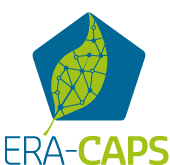Understanding the climacteric vs non-climacteric fruit ripening mechanisms in melon using transcriptomic, metabolomic and reverse genetic approaches
- Acronym MELRIP
- Duration 1 April 2007 - 1 April 2010
- Project leader Jordi Garcia-Mas, Centre for Research in Agricultural Genomics CSIC-IRTA-UAB, Spain
-
Other project participants
Abdel Bendahmane, INRA - Plant Genomics Research Unit URGV, France
Danièle Hosemans, Vilmorin Clause & Cie [Company], France
Michel Pitrat, INRA - Research Unit for Genetic Improvement of Fruit and Vegetables GAFL, France
Mark Stitt, Max Planck Institute for Molecular Plant Physiology, Germany
Fernando Nuez, Center for the Conservation and Breeding of the Agricultural Biodiversity COMAV, Spain
Torben Jahrmann, Semillas Fitó S.A. [Company], Spain
-
Funding
National Institute for Agricultural Research (INRA), France
Research Centre Juelich – Project Management Juelich (FZJ-PTO) on behalf of the Federal Ministry of Education and Research (BMBF), Germany
Ministry for Education and Science (MICINN), Spain
- Total Granted budget € 922,522
Abstract
Melon is an attractive model species that may help to understand the molecular differences between non-climacteric and climacteric fruit ripening because it contains both types of genotypes. This proposal involves the simultaneous use of transcriptome and metabolome analysis in climacteric and non-climacteric melon lines in order to understand the molecular differences between both types of fruit ripening. A search and analysis of melon mutants in key genes in fruit ripening will also be performed. The TILLING and EcoTILLING technologies will enable the identification of mutants that do not have a distinctive visible phenotype. The discovery of such novel variants could directly lead to the creation of new melon hybrid cultivars with commercial interest, a task that will be undertaken by the two private partners that participate in this proposal.
